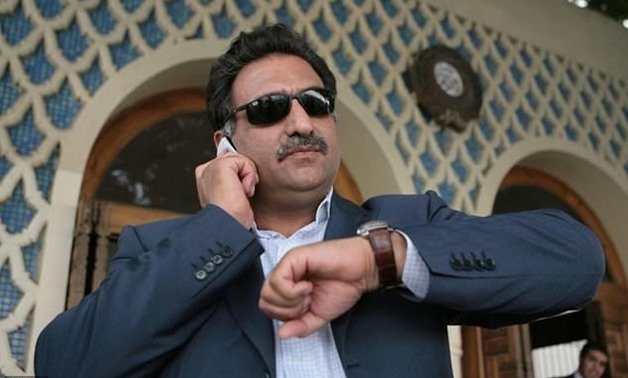
Azmi Bishara in Cairo, 22 April 2007. He resigned that day from his position as a Knesset lawmaker, giving his notice at the Israeli embassy in Egypt's capital.
DUBAI, UAE - 6 June 2018: A controversial Arab Israeli former legislator who fled his homeland over a decade ago, Azmi Bishara is now among the key diplomatic players in the crisis that estranges Qatar from Saudi Arabia and other Gulf peers.
Once a Knesset black sheep over his pro-Palestinian stance, Bishara left Israel in 2007, accused of advising Lebanese Shiite militia Hezbollah, a charge he denied.
A former Marxist and founder of Balad, an Arab Israeli political party, Bishara has since reinvented himself as an Arab public intellectual, close to Qatar's circles of power.
He is an Israeli Arab, defined as descendants of Palestinians who remained on their land when Israel was created in 1948. They account for around 17.5 percent of Israel's population today.
Bishara is a major personality in Qatari media and has a Twitter following of more than 1.4 million.
Critics of the 61-year-old Christian from Nazareth accuse him of permanently shifting alliances -- politics that have seen him labelled a supporter of "terrorism", along with his host Qatar.
- 'Qatar's Rasputin' -
Saudi Arabia, the UAE, Bahrain and Egypt all cut ties with Qatar a year ago, accusing the country of links to Sunni Islamist extremists and supporting Shiite Iran.
Iran is the key regional ally of Lebanon's Hezbollah, and Saudi Arabia's arch nemesis.
"Bishara plays a key role in Qatar's approach to the region and the world through media and research," said Theodore Karasik of the Gulf State Analytics research group.
"His role is indisputable," Karasik told AFP. "Given the harsh intra-Gulf fight, and the likelihood of a permanent cleavage, the Palestinian intellectual is likely to continue to find safety in Doha".
On social media and regional TV broadcasts considered close to Saudi Arabia and its allies, Bishara has been slammed as "Doha's Rasputin", a Mossad agent and the "godfather of terrorism".
"What has been written about Bishara in the Gulf media has been widely exaggerated," said Andreas Krieg, a defence expert at King's College London who has consulted for the Qatari government.
"He is a Christian Palestinian who used to have an Israeli passport. He once was a socialist but has changed his political views over time," Krieg said.
"To call him a godfather of terrorism makes no sense."
- Continuing controversy -
Bishara was a controversial figure long before his involvement into Qatari politics.
He resigned from the Knesset in 2007, amid investigations into his alleged role alongside Hezbollah in the war with Israel the year before.
He was also stripped of parliamentary immunity over what authorities said were anti-Israeli comments and ties to Syria.
His books are banned in Saudi Arabia and in 2014 Riyadh demanded Qatar shut down the Arab Center for Research and Policy Studies, a high-profile, Doha-based think tank headed by Bishara.
"Since the UAE and Saudi view any form of dissidence and opposition as a threat to the state, the liberal narratives of Bishara's centre and media outlets run counter to policies in Abu Dhabi and Riyadh promoting the myth of authoritarian stability," said Krieg.
Other critics say the mustachioed politician has only his personal interests at heart.
And no matter the outcome of the Gulf crisis, analysts say he will likely survive politically.
"If Qatar changes path then, of course, Bishara will run somewhere else," said Karasik.


Comments
Leave a Comment